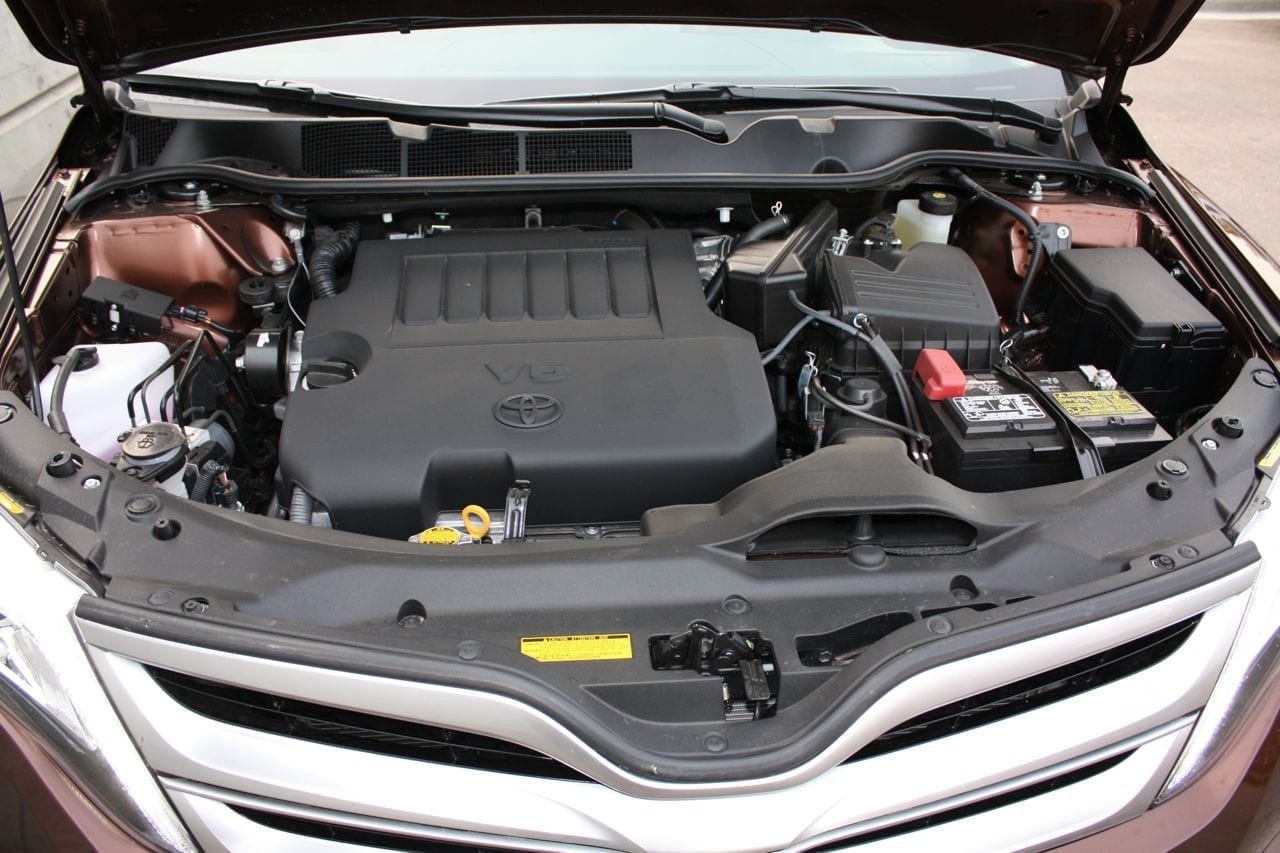The Toyota Venza has quietly become a common sight on roads, blending the lines between a wagon and a crossover with its unique styling and practical features. Many drivers are drawn to the Venza for its comfort and versatility, but one crucial aspect for any car owner is fuel consumption. If you’re considering a Toyota Venza, understanding its real-world MPG (miles per gallon) and fuel efficiency is essential. This review delves into the fuel consumption of the Toyota Venza, drawing insights from a week-long experience and examining what you can expect in terms of gas mileage.
Understanding Toyota Venza Fuel Economy
The Toyota Venza, especially models like the 2013 version reviewed here, is equipped with a robust 3.5-Liter V-6 engine. While this engine provides ample power, fuel economy is a natural concern. Let’s break down the official fuel consumption ratings and real-world observations to give you a clearer picture of what to expect from your Toyota Venza in terms of gas mileage.
Official EPA Ratings vs. Real-World MPG
According to Toyota’s official figures for the 2013 Venza with all-wheel drive and the 3.5-Liter V6, the fuel consumption is rated at 11.4 L/100 km (21 mpg) in the city and 7.9 L/100 km (30 mpg) on the highway. These figures are essential benchmarks, but real-world driving conditions often vary, impacting actual fuel consumption.
In a real-world test drive, the reviewer experienced slightly different numbers. City driving resulted in an average of 13.1 L/100 km (18 mpg), and extended highway trips showed 9.8 L/100 km (24 mpg). It’s important to note that these figures can fluctuate based on driving habits, traffic conditions, and vehicle maintenance.
Factors Affecting Venza Fuel Consumption
Several factors can influence the fuel consumption of your Toyota Venza. Understanding these can help you optimize your driving habits and vehicle maintenance for better gas mileage.
- Engine Size and Type: The 3.5-Liter V6 engine in the reviewed Venza, while powerful, is naturally less fuel-efficient than smaller engines. Toyota also offered a 4-cylinder version of the Venza, which would typically offer better fuel economy.
- All-Wheel Drive (AWD): The presence of an all-wheel-drive system, as in the test vehicle, adds weight and mechanical complexity, both of which can slightly increase fuel consumption compared to a front-wheel-drive model.
- Driving Conditions: City driving, with frequent stops and starts, generally leads to higher fuel consumption than steady highway cruising. Aggressive driving, including rapid acceleration and hard braking, will also decrease fuel efficiency.
- Vehicle Weight: The Toyota Venza, weighing in at around 4045 pounds, is not a lightweight vehicle. Its weight contributes to fuel consumption, especially during acceleration and uphill driving.
- Transmission: The 6-speed automatic transmission in the Venza is designed for smooth shifting and efficiency, but its performance and the driver’s use of it still play a role in fuel consumption.
- Maintenance: Regular vehicle maintenance, such as tire inflation, oil changes, and air filter replacements, is crucial for maintaining optimal fuel efficiency.
Real-World Fuel Consumption Experience
The reviewer’s week with the Toyota Venza provided valuable insights into its real-world fuel consumption. Driving primarily in the city, the average fuel consumption was 13.1 L/100 km (18 mpg). This is less than the official EPA city rating, suggesting that real-world city driving, possibly with traffic and varying speeds, can lead to slightly lower MPG.
On an extended highway trip of approximately 250 kilometers (around 155 miles) at about 120 km/h (75 mph), the fuel consumption improved to 9.8 L/100 km (24 mpg). While an improvement from city driving, this highway figure is also slightly below the official 30 mpg rating. This difference could be attributed to factors like driving speed, terrain, and potentially wind resistance at higher speeds.
It’s important to consider that these figures are from a 2013 model. Fuel efficiency standards and engine technologies have evolved, so newer Venza models, particularly hybrid versions introduced in later generations, are expected to offer significantly improved fuel consumption.
How Venza Fuel Consumption Compares to Competitors
In the vehicle class of wagons and crossovers, the 2013 Toyota Venza’s fuel consumption is competitive but not class-leading. Vehicles in the same category with similar engine sizes and AWD systems often exhibit comparable fuel economy. However, smaller crossovers or wagons with 4-cylinder engines would typically offer better gas mileage.
For a more direct comparison, consider vehicles like the Honda Crosstour, Subaru Outback (with a 6-cylinder engine), or Nissan Murano from the same era. Comparing the EPA ratings and real-world reviews for these models can provide a better benchmark for the Venza’s fuel consumption within its competitive set.
Beyond Fuel Consumption: Other Aspects of the Toyota Venza
While fuel consumption is a key consideration, the Toyota Venza offers a range of other features that contribute to its appeal. Understanding these aspects provides a more holistic view of the vehicle.
Comfortable and Spacious Interior
The Venza’s interior is noted for its spaciousness and comfort. It offers ample headroom and legroom, even with the inclusion of sunroofs. The seating position is high, providing a commanding view of the road, and the seats are comfortable for longer journeys, although they might lack some side bolstering for more spirited driving.
The materials used in the interior are described as nice, with soft-touch plastics and leather accents, contributing to a premium feel. The layout of the dashboard is functional, with controls for audio, climate, and navigation easily accessible, although the reviewer noted the interface wasn’t the most visually appealing.
Practical Storage and Cargo Space
Practicality is a strong suit of the Toyota Venza. It offers innovative storage solutions, including a clever smartphone slot in the center console, which the reviewer particularly appreciated. The glove box and center console storage are generous, and the trunk space is substantial at 30.7 cubic feet (870 Liters), expanding to a massive 70.1 cubic feet (1985 Liters) with the rear seats folded. This cargo capacity makes the Venza highly versatile for families and those needing to transport larger items.
Driving Experience and Handling
The Venza delivers satisfying power for everyday driving, with adequate acceleration and passing power. The transmission is smooth and responsive. However, it’s not designed for sporty handling. The steering is described as numb, and there’s noticeable body roll in corners. The ride quality, on the other hand, is praised as fantastic and quiet, making it a comfortable cruiser for city and highway driving.
Reliability and Build Quality
Toyota is renowned for its reliability, and the Venza is no exception. The build quality is described as excellent, with a premium feel throughout the vehicle. This reputation for reliability is a significant factor for many buyers considering a Toyota.
Conclusion: Is the Toyota Venza Fuel Efficient?
The fuel consumption of the 2013 Toyota Venza, equipped with a V6 engine and AWD, is decent for its class but not exceptional. Real-world MPG figures are slightly lower than official EPA ratings, particularly in city driving. If fuel efficiency is your top priority, exploring newer Venza models, especially hybrid versions, or considering 4-cylinder variants of older models might be beneficial.
However, when considering the Venza, fuel consumption should be balanced with its other strengths: a comfortable and spacious interior, practical storage, good straight-line performance, and Toyota’s renowned reliability. For drivers seeking a comfortable and versatile wagon/crossover with adequate power and acceptable fuel economy, the Toyota Venza remains a compelling option, especially if other factors like space and reliability are also high on your list.
Ultimately, understanding the real-world Toyota Venza Fuel Consumption allows you to make a more informed decision based on your driving needs and priorities. If you prioritize fuel efficiency above all else, further research into newer models or alternative vehicles is recommended. But if you value a balanced package of comfort, space, and reliability alongside reasonable fuel economy, the Venza is worth considering.

